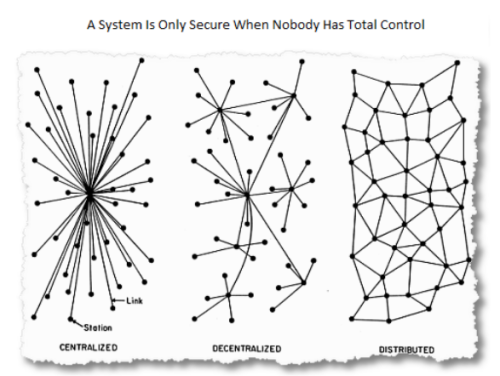My friend and fellow Common Tabler Pete comes at emergence not via the plethora of niche-market Christian books, but through science. He is a systems engineer by trade, a musician by training, and a scientist by passion. Last month he came and guest lectured in my Wesley Seminary course on Emergence Christianity, to rave reviews. He talked about systems theory, special relativity, quantum physics, flocking, music, and emergence, relating all of it to the grassroots changes we are seeing in churches as well as the culture as a whole.
So I took note several days ago when he Facebook posted this arresting image that he found at Reddit:
Pete added the simple caption, “priesthood of all believers”, getting my attention as he invoked that great unfunded mandate of the Reformation. As it made its way around the web of Facebook, I was surprised to see that some folks saw that caption and assumed that the nodes were not representing individual people, but rather Christian congregations. So, the first image was depicting Catholicism, the second was depicting the Easter Orthodox Church, and the third was depicting Protestantism. The assumption seemed hardwired, and unquestioned: churches need someone in charge. Churches must rely on the abilities of the many, but there need to be a few members of those groups whose abilities are more special and more important and more exalted than the abilities of everyone else. We call these people ‘pastors’ or ‘priests’ or ‘leaders’, and they speak on behalf of everyone else.
What might have been missed, too, was the simple fact that this image was not originally designed to describe the church, but instead represents a way of thinking becoming more and more mainstream in our culture: people are distrustful of large organizations, even those which are technically ‘decentralized’. Folks want to contribute more of their own ideas when they organize themselves around tasks and causes, and they prefer to listen to the input of those who are geographically and relationally proximate, rather than to only listen to some more distant bureaucrat.
It is apparently difficult for some folks to imagine that the ideal of the Priesthood of All Believers might actually apply to everyone in the church. And to see that it’s not only a theological doctrine that drives us there– it is the rising cry of people everywhere.












